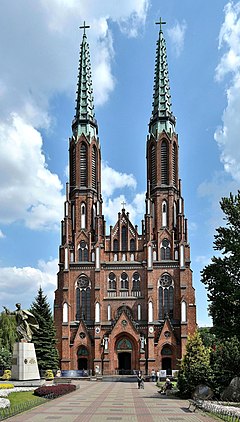St. Florian's Cathedral
| Cathedral of St. Michael the Archangel and St. Florian the Martyr Katedra Świętego Michała Archanioła i Świętego Floriana (in Polish) | |
|---|---|
 | |
 | |
| General information | |
| Architectural style | Gothic Revival |
| Town or city | Warsaw |
| Country | Poland |
| Construction started | 1897 |
| Completed | 1904 |
| Demolished | 1944 (rebuilt 1952-1972) |
| Client | Roman Catholic Archdiocese of Warsaw |
| Design and construction | |
| Architect | Józef Pius Dziekoński |
St. Florian's Cathedral, more formally known as the Cathedral of St. Michael the Archangel and St. Florian the Martyr (Polish: Katedra Świętego Michała Archanioła i Świętego Floriana), is a Catholic church and historic landmark at ul. Floriańska 3 (English: 3 St. Florian's Street) in eastern Warsaw. The 75-meter towers of St. Florian’s Cathedral dominate Warsaw's Praga district.
History[]
There has been a Catholic church presence in or around the site of the future church since 1583. However, the impetus for creating a lasting church did not arrive until the late 19th century, when Poland was not an independent country.[1] The map of Europe was redrawn during the 1815 Congress of Vienna and the resulting territorial maneuvers placed the French Duchy of Warsaw under the control of the Russian Empire, transforming it into the Congress Poland.[2] Among other intrusions, over twenty Russian Orthodox churches were built in Congress Poland.[3] To protest against the perceived imposition of a foreign church, and in direct reaction to the monumental Orthodox Church of Mary Magdalene built down the street, St Florian’s was built with two commanding 75-meter (250-foot) towers between 1897-1904.[1][4]
The church is named after St. Florian, the patron saint of professions associated with fire, such as firefighters, steelworkers, chimney sweeps, potters and bakers.[1]
World War II destruction[]
During and after the Siege of Warsaw, churches were used as a hiding place for Jews, the Warsaw Army (Armia Warszawa) and as a general refuge for civilians.[5] St. Florian's was destroyed by the Germans as they withdrew from Poland in 1944 after the Warsaw Uprising.[6] The church remained in ruins for several years, but by the 1950s a reconstruction effort slowly began with support from Praga residents. The rebuilt church was reopened in 1972.[1]
Role in church hierarchy[]
St Florian's is the cathedral church of the Roman Catholic Diocese of Warszawa-Praga and by order of the Holy See was raised to the rank of minor basilica in 1992.[1] Over four hundred priests form the ministry in this diocese covering 1,274 square miles, divided into 160 parishes and serving approximately one million Polish Catholics.[7]
Notable features[]
St Florian's is built in a Gothic Revival style distinguished by two twenty-story towers facing Al. Solidarności (English: Solidarity Avenue), capped with bronze spires. Most of its exterior is made of red brick. Over the entrances are mosaic depictions of Jesus Christ and the emblem of the first bishop of Warsaw-Praga, Kazimierz Romaniuk, while the interior is decorated in red or white plaster and brick.[1]
See also[]
- Places of worship in Warsaw
- National Temple of Divine Providence
- St. Florian's Church, Kraków
Gallery[]
References[]
- ^ a b c d e f (in Polish) Cathedral of St. Michael the Archangel and St. Florian the Martyr website Archived 2011-03-14 at the Wayback Machine Retrieved March 29, 2011
- ^ Nicolson, Sir Harold (2001). The Congress of Vienna: A Study in Allied Unity: 1812–1822 Grove Press; Rep. Ed. pp. 140-164. ISBN 0-8021-3744-X
- ^ Wortman, Richard S. (2000). Scenarios of Power: Myth and Ceremony in Russian Monarchy. Volume Two: From Alexander II to the Abdication of Nicholas II. Princeton University Press. pp. 254–255. ISBN 978-0-691-02947-4.
- ^ Official Tourist Website of Warsaw, Warsaw Tourist Office. Retrieved March 30, 2011.
- ^ Paweł Giergoń. "Kościół św. Jacka". www.sztuka.net (in Polish). Retrieved March 30, 2011.
- ^ Warsaw Uprising 1944, WarsawUprising.com, developed and maintained by Project InPosterum. Retrieved March 30, 2011.
- ^ Cheney, David M., "The Hierarchy of the Catholic Church", Catholic-Hierarchy.org. Retrieved March 30, 2011.
External links[]
| Wikimedia Commons has media related to Saints Michael Archangel and Florian Basilica in Warsaw. |
- 1901 establishments in Poland
- Basilica churches in Poland
- Buildings and structures demolished in 1944
- Buildings and structures in Poland destroyed during World War II
- Demolished buildings and structures in Poland
- Gothic Revival church buildings in Poland
- Praga-Północ
- Rebuilt churches in Poland
- Roman Catholic cathedrals in Poland
- Roman Catholic churches completed in 1904
- Roman Catholic churches completed in 1972
- Roman Catholic churches in Warsaw






